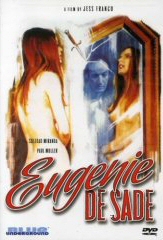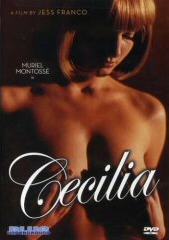
Jess Franco directed so many films that, after awhile, you almost become desensitized -- overwhelmed -- by his monumental, frantic output. One day you discover that you've seen one crotch zoom too many, gasping for air in a surrealistic jazz riddled hell of bed-post lap dances and Howard Vernon glares. One gasping scene of fetishistic violence bleeds into another, erotic dream-time logic takes over your life, and you're spouting lines from Faceless at the breakfast table. Yet the Franco devotee doesn't watch his films (or rarely) for fine plots but for unparalleled and deeply personal moving pictures that speak to the subconscious. Eugenie De Sade combines Franco's devotion to style with -- for once -- a solid narrative, making it one of his more effective achievements. Even more so than Venus in Furs or Succubus, this deeply realized poem to ruined innocence marries the director's visual and thematic preoccupations with uncharacteristically penetrative storytelling. A shadow-play of delirious sexuality and amorality, this rarely seen chapter in Franco's career explores, along with The Sexual Story of O, the human heart in conflict with animal pleasure and social responsibility. Blue Underground rescues this neglected film with a spot on presentation hard to find fault with.
A sensationalized storm of longing, sexual obsession, and self victimization, Eugenie De Sade disturbs our preconceived notions of right and wrong, love and hate. Franco himself stars in the film as Attila, a journalist investigating a murder, hoping to score a bestselling book out of it. He watches a film of Eugenie (Miranda) entertaining a mysterious woman which a man suddenly strangles to death. She reveals that the footage was a snuff film made by her step-father Albert Radeck, a radical philosopher in the vein of de Sade. Eugenie begins her trip into debauchery by studying his pornography collection. When he discovers this, Albert warps her willingness to please him into an agreement to help him murder a model. He also reveals that he murdered her parents to ensure she would be raised in accordance with his philosophies. Soon after, they engage in a sexual affair -- an orgy of unnatural lust that is shattered when Eugenie develops feelings for Albert's next intended victim.
Fresh from the success of his creative time with Harry Towers, Franco entered a more intimate and exploitative side of his career with a series of non-related yet thematically linked dreams of death and desire. Based on the writings (and sexual philosophy) of the infamous Marquis de Sade, this scandalous interpretation of temptation and obsession is a surprisingly faithful rendering of De Sade's pet themes, particularly the inherent animalistic right of the strong to enjoy the submission of the weak. Soledad Miranda haunts each frame with her natural ability; her contradictory vulnerability and seductiveness embodies the very essence of both victim and victimizer; her facial expressions are a roadmap of longing and desire, and the character she plays resonates with Franco's reoccurring theme of the innocent/victim who plays a crucial part in her own debasement. This is further enriched by Franco's decison to make Albert's character multi dimensional. He is neither completely hateful or likeable, but something of a strangely charismatic rouge. This makes their relationship and the following crimes more believable and disturbing.
The construction of plot resonates with the hallucinatory uncertainty and strained elegance of a dream, unfolding with delicious uncertainty. Yet the method of narration, and the believability of the performances, forces us to view increasingly terrifying and erotic events (and their undercurrent of strangeness and fear) in a context of forced naturalism. Eugenie also has the honor of being one of the few films -- along with Justine de Sade and The Story of Her Journey into Perversion -- of truthfully representing the source material of Franco's aesthetic brother in both style and theme. Unrepentantly voyeuristic, this is as much a confession as a study of obsession. It is no surprise that Franco should have cast himself alongside his muse here, nor that his roving camera lavishes almost obscene detail on her own journey into erotic slavery and obsession. Bruno Nicolai further strengthens the film, lending dark majesty to the haunting nuances of the story (and Soledad's enchanting persona). An early nod to post-modernism, the film references the interplay between cinematic magic and life, as well as the relationship between illusion and reality. This later element is most strongly realized in the scene where Eugenie and Albert prepare to kill the model, posing as photographers on a shoot, having her smear herself with crimson lipstick before actually killing her. Thankfully this self-referencing doesn't overshadow the story itself, resulting in one of Franco's more disturbing and believable works.
Blue Underground does another excellent job presenting a rare, dark treasure of exploitation cinema for our enjoyment. Eugenie De Sade is featured in anamorphic widescreen in an aspect ratio of 1.66:1. The colors are bold and clean, and the picture is free from grain. This is every way superior to both the Wild East release (which also lacked the French audio track). Audio is featured in both English mono and French tracks. The English audio, while serviceable and clean, is inferior to the French version, as hearing the intended language further immerses you into the twisted and exotic experience.
Extras are scarce but informational, including "Franco de Sade," a lengthy interview where the director covers his affinity with the writings and thoughts of the Marquis de Sade, focusing on this film's then shocking sadism/masochism. Personal matters are also discussed, including his feelings toward Soledad, whom he adamantly denies he had an affair with. Franco's English is difficult to understand but English subs make certain you loose nothing of his biting humor. Warning: don't watch this if you've quit smoking recently. Franco pops cigarettes like breath mints, leaving you hungry for one yourself! A Trailer concludes one of Franco's most harmonized, rewarding, and bewitching explorations of innocence ravished. A fitting DVD presentation of one of the director's most tightly knit creations, echoing Venus in Furs as a pinnacle of his obsession 'with' obsession.
* * *

Cecilia, the second DVD released by Blue Underground by Franco this month, continues the director's love affair with obsession, focusing on a bored housewife whose teasing attitude leads to more than she bargained for. Again traveling the sweat-drenched byways of sexual enticement turned deadly, this limpid testament of sexual freedom and discovery is a less taboo or intriguing offering. Subdued for Franco, the 'happy' ending feels tacked on and somewhat lessons the effect of all the proceeded it. On the plus side, Franco manages to capture the essential beauty of the countryside, so at least several shots 'look' good. Unfortunately, this is poor compensation for a trite story.
Cecilia is a bored and somewhat bratty aristocrat whose life takes an unexpected detour when sexual temptation leads to rape. Taken by the servants who she teased, Cecelia finds herself aroused rather than repulsed by the experience and a rift develops between her and her husband as she seeks new partners. This quite unceremoniously leads to her discovering that the only man for her is -- yup, her husband.
Similar in tone to The Inconfessable Orgies of Emmanuelle, Cecilia is an uneven if occasionally good looking piece of filmmaking. A Eurociné production, the picture suffers from a weak story and, perhaps most damaging, a character who, despite her sex appeal, fails to fully summon our interest. The sex scenes lack the exotic sleaze and sweaty charm of Franco's more inspired works. Likewise, the settings and pace, while well photographed, lack the dream-like grace or eccentricity that often makes Franco's film worthwhile. Franco's obvious disinterest in this material -- and his lack of trademark visual flourishes -- was transmitted to the camera. Performances and décor are both bland. Franco graced many low budget exploitation plots with verve and aesthetic substance. Unfortunately Cecilia is little more than a softcore programmer, with the performers seeming as bored between the sheets as you will be watching them.
Blue Underground has treated this film with far more attention than it deserves, continuing to earn their reputation for saving rare and obscure cult films from the dust bin. Cecilia looks far better than its story merits, thanks to a minute restoration job. Offered in 1.66:1 widescreen, the print is clean and crisp and highly detailed. Colors stand up to scrutiny as well, deep and clean. Audio options include English and French Mono. Both are clear without background interference but the French track provides the most authentic experience. Extras are limited to a Theatrical Trailer and "Sexual Aberrations of Cecilia," an interview with Franco. This last piece is more entertaining than the film, as Franco's opinions are always worth hearing. Here he discusses in horrible English (yes, English subs are available!) about the film and shooting it in Portugal.
Review by William Simmons
| Released by Blue Underground |
| Region 1 - NTSC |
| Not Rated |
| Extras : |
| see main review |